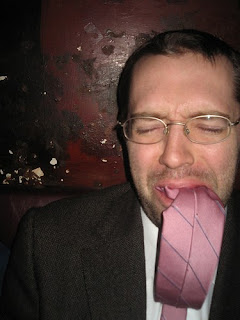i should call this "impressions of a film," because i'm not really doing anything academic or responsibly critical. and it's certainly not terribly thorough.
but before i get to last night's feature, i'd like to bum you out by sharing the utterly depressing observation i made last night: the sun is setting around 7:00pm now. in another short month, it will be 6:00, and then, god save us, on november 4th, it will be dark before 5:00. you go to hell, nature. you go straight to hell.
Down By Law, 1986, Jim Jarmusch. Fairly early in this film I decided that the visual style was decidedly Japanese, at least so far as I am familiar with Japanese. The long sideways tracking shots of the opening and the almost always excellent composition of the people within the frames, usually just sitting and talking, reminded me of everything that I like so much about older Japanese films. Of course the fact that this film is shot in black and white only serves to heighten the recognition.
You could also say that the film is gritty, but it's not necessarily shot that way; I think the grittiness comes almost solely from the settings: the swamps of Louisiana and the run-down streets of New Orleans. These settings are so rich though that they really do serve as another character, never fading into the distance or simply serving as a canvas. For instance, the escapees are almost constantly wading through the swamp, or along the water, or in a boat, making comments about their surroundings. Or earlier in the film, Tom Waits is shown for a fairly long time outside in the street sitting on the garbage-(his garbage)-strewn curb. To me, this stuff was obviously put in on purpose, to make this film not just about the story but about the place, and to pit the characters not just against themselves but against the world around them. There is not anything abstract or even metaphorical about these settings.
To me, this film seems like a particular snapshot of Americana, and within that, it gives an odd kind of perverse sense of the American Dream. I say "perverse" because it's not really the cliched American Dream, more the Outsider's American Dream (in fact, it's anti-cliche in another way: you could also call this a buddy movie but the two buddies in this film spend the whole time antagonizing each other and refusing ever to acknowledge their buddy-ness. They want only to separate and at the end that's exactly what they do, without any melodrama or sentimentality). The two protagonists don't want any kind of domestic happiness or social acceptance or comfort; all they seem to want is freedom. Freedom from the law, freedom from money, freedom from women. Actually--freedom from what would traditionally be considered the American Dream.
When Tom Waits's girlfriend is yelling at him and telling him it's finished, he is silent. It doesn't seem to bother him that she's leaving, or even that all his possessions are scattered on the street. He simply picks up his shoes and goes. Similarly, when John Lurie's prostitute (girlfriend?) is giving him a dissertation on his failed life, he is unconcerned and isn't even paying attention, relieved when the phone rings.
I haven't yet mentioned who I consider the antagonist of this film--Roberto Benigni's character--but he plays a very important role. (This is the same Roberto Benigni of Life is Beautiful and Oscar-speech fame.) See, this character is pining for the traditional American Dream: in the middle of their fugitive run, he decides to settle down, get married, run a restaurant with his wife, and generally live happily ever after in his own personal slice of heaven. He's also the catalyst for the friendship of the two protagonists. And he rather obviously helps to prove my earlier point when the protagonists refuse his offers to stay with him and quite literally walk away from his American Dream. Beyond all that, he's just damned entertaining. You've heard it before, but you really can't take your eyes off of him while he's on screen. Let's just say I was very impressed.
I've said a lot of bad things about American film of the 1980s, so this might not be much coming from me, but I'd have to put this fairly high on my list of best 80s movies. It's only my second Jarmusch film, but it's quite a lot better than Broken Flowers.
Subscribe to:
Post Comments (Atom)


1 comment:
and then there were they and they were few
Post a Comment